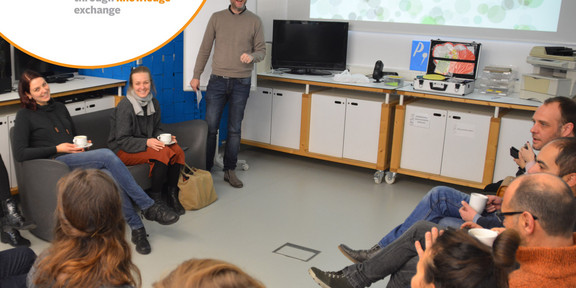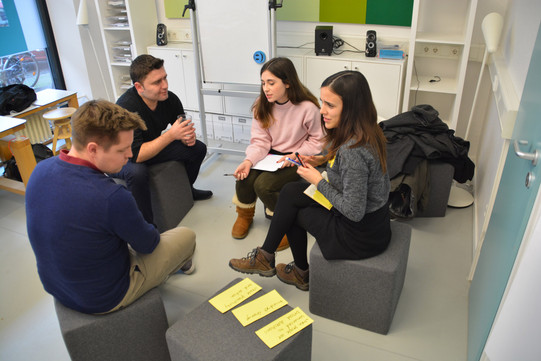PIKSL as the host of a workshop for the international SIKE-Team in Düsseldorf

On Wednesday, February 6th, employees of the projects SIKE (Social innovation through knowledge exchange) and PIKSL (Person-centered interaction and communication for more self-determination in life) met for a cross-project workshop in the PIKSL laboratory in Düsseldorf. Dmitri Domanski and Sabrina Janz (SIKE) as well as Jennifer Eckhardt and Christoph Kaletka (PIKSL) represented the Social Research Centre Dortmund (sfs) as scientific partner in both projects. The joint exchange focused on the topics social innovation and co-creation.
The PIKSL project was initiated in 2010 by the Düsseldorf based “In der Gemeinde leben gGmbH” (IGL). The aim of the project is to provide barrier-free access to modern information technologies and media for people with digital educational needs. Therefore PIKSL brings together people with and without disabilities in its laboratories in Düsseldorf and Bielefeld to jointly develop products and services. People with learning difficulties are actively involved in problem solution and innovation processes. They are the experts in reducing the complexity of digital content. PIKSL cooperates with Higher Education Institutions as well as economic partners.
The SIKE project was initiated in 2018 by the Erasmus+ programme of the European Union and brings together partners from Croatia, Germany, Portugal, Spain and the United Kingdom. In every country, one Higher Education Institution works together with a non-academic partner organisation in the field of social innovation. SIKE demonstrates the potential of Higher Education Institutions to affect social change and innovative processes by knowledge transfer with partners from practice. PIKSL serves as a case study for SIKE, which points out interesting approaches in the field of co-creation and cooperation with Higher Education Institutions.
The hosts of the PIKSL project around Marius Mews and Tobias Marczinzik invited to the workshop in the laboratory in Düsseldorf to create an exchange. The key subjects of the workshop were in particular the highlighting of similarities around the subject co-creation as well as the efforts to scale and disseminate socially innovative initiatives. The possibilities and limitations of the presentation of social impact within the framework of special business reports and the potentials of science and practice collaborations were points of mutual interest in the lively discussions.




![[Translate to English:] [Translate to English:]](/storages/zentraler_bilderpool/_processed_/a/f/csm_Kontakt_b86e8d8ecc.png)
![[Translate to English:] [Translate to English:]](/storages/sfs-sowi/_processed_/7/e/csm_header_collage_sfs_eving_sozialforschungsstelle_dortmund_31bd3c09fb.jpg)
